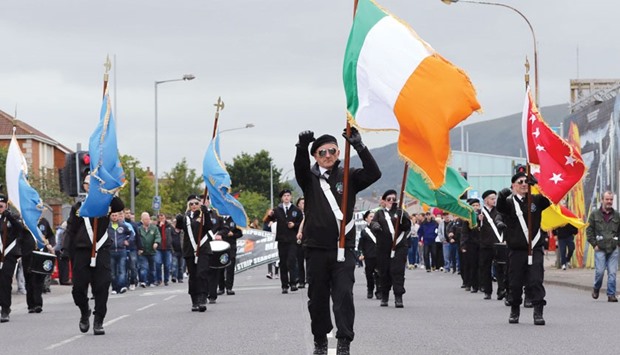Anti Internment League was kept out of Belfast city centre by riot squad officers and armoured vehicles.
The Irish republican dissident march has dispersed peacefully.
Approximately 2,000 people were blocked from entering central Belfast by riot squad officers and up to 30 armoured land rovers at the bottom of the Falls Road.
The Anti Internment League held a parade yesterday to mark the 45th anniversary of the introduction of internment without trial by the Stormont administration, with the support of the UK government, during the height of the Troubles in August 1971.
The controversial policy of detaining terrorist suspects without trial ended four years later.
Organisers claimed internment was still being used against Republicans opposed to the peace process and power sharing in Northern Ireland through the use of lengthy remand periods before trials.
Speaking at police lines on the spot where the march was not allowed to go any further, the league’s spokesman Gerard Fitzpatrick said the ban proved it was a myth that Belfast “was a shared city for all”.
The Parades Commission, the body which adjudicates on contentious marches in Northern Ireland, ruled last month that the march should not be allowed into Belfast’s central shopping district.
Last year three men and a woman were arrested during a riot after the same march was barred from the city centre.
The Anti Internment League said it planned to take a civil legal action against the commission’s decision.
Northern Ireland police on Friday arrested a man over the shooting dead of 10 Protestant textile workers in 1976 in one of the deadliest of three decades of sectarian attacks in Northern Ireland.
No one has ever been convicted for the crime, which an inquiry said was carried out by the Provisional IRA who targeted the men because of their religion.
The IRA has always denied involvement in the attack near the village of Kingsmill, county Armagh, in January 1976, when gunmen forced workers from a minibus and shot them dead at close range.
The one Catholic worker was instructed to run from the scene.
The incident was one of a series of tit-for-tat attacks by Protestant loyalist paramilitaries who wanted Northern Ireland to remain part of the United Kingdom and Catholic Irish nationalists who wanted a united Ireland.
A 1998 peace agreement paved the way for a power-sharing government of loyalists and Irish nationalists and mostly ended the cycle of violence, though some small armed groups remain.
Police on Friday said they had arrested a 59-year-old man in Newry on suspicion of the murders.
Investigators earlier this year found a match with a palm print found on a getaway car.
Investigations of historic crimes have in the past caused tension between the governing parties, which include former militants.

Republicans march in an anti-internment parade, marching from the Falls road, before the parade was stopped by police at the outskirts of Belfast city centre.
